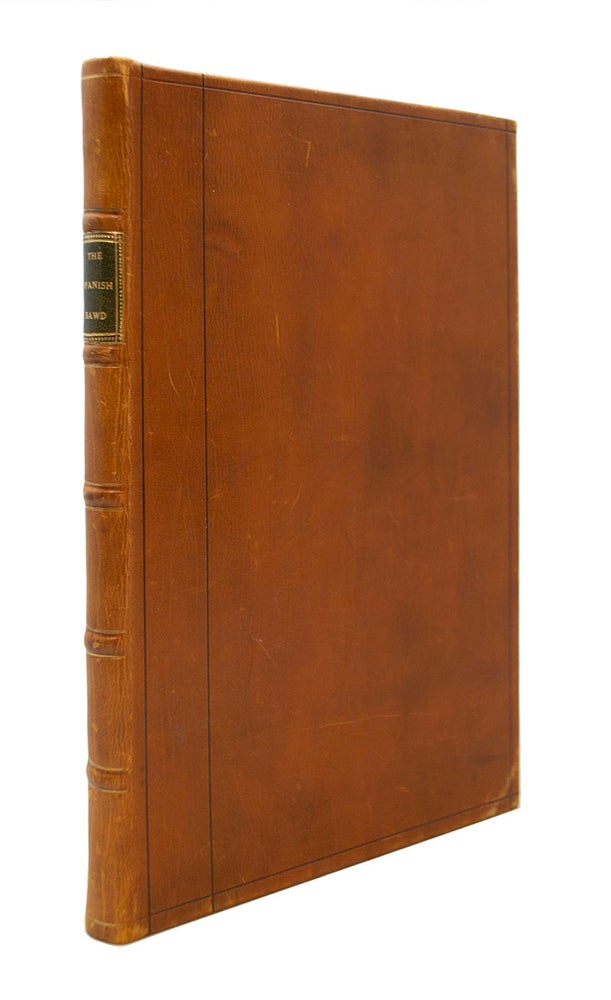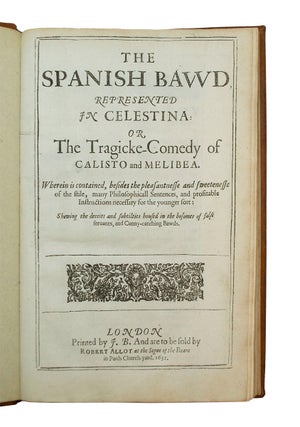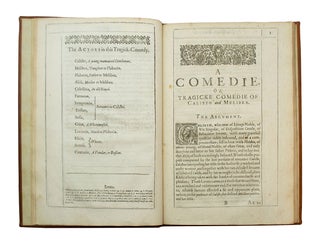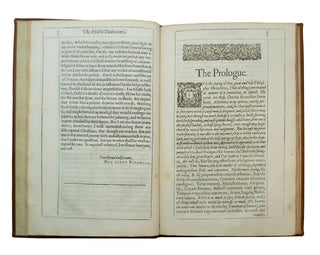First English Edition of the First European Novel
Spanish Bawd, represented in Celestina. or, The tragicke-comedy of Calisto and Melibea. Wherein is contained, besides the pleasantnesse and sweetenesse of the stile, many philosophicall sentences, and profitable instructions necessary for the younger sort: shewing the deceits and subtilties housed in the bosomes of false seruants, and cunny-catching bawds.
London: rinted by J[ohn]. B[eale]. and are to be sold by Robert Allot, 1631.
First Edition of the first full English translation of Celestina, translated by James Mabbe. And often considered the first European novel. Small folio (10 3/4 x 7 3/8 inches; 275 x 182 mm). [14], 202, pp. With some misprints in pagination. Bound without the inital and final blank. Text written in play format. With woodcut vignette on title page, woodcut headers and initials.
Full modern calf. Ruled in blind. Spine with green morocco spine label, lettered in gilt. With light dampstaining to outer margins of last 6 signatures. Leaf O with closed tear paper flaw, not affecting text. Small bookseller label on rear pastedown. Overall very good.
“Often considered the first European novel, La Celestina was profoundly influential in the development of European prose fiction and is valued by critics today as much for its greatness as literature as for its historical significance” (Encyclopedia of Literature, 222).
"'If Cervantes had never been born', says Menendez y Pelayo (Origines de la Novela), 'Celestina would be the greatest imaginative work produced in Spain.' Gerald Brenan (Literature of the Spanish People) makes an even higher claim for this single production of the Spanish-Jewish lawyer, Fernando de Rojas. Placing it above all other Spanish prose works prior to the middle of the 19th century, he affirms that it is 'not only the first European novel, but one of the greatest'. It certainly is a novel, although it is written in dramatic form." (William Salloch).
"La Celestina, Spanish dialogue novel, generally considered the first masterpiece of Spanish prose and the greatest and most influential work of the early Renaissance in Spain.
Originally published in 16 acts as the Comedia de Calisto y Melibea (1499; Comedy of Calisto and Melibea) and shortly thereafter in an expanded version with 21 acts as the Tragicomedia de Calisto y Melibea (1502), the work has been popularly known since its publication as La Celestina after its chief character, the bawd who serves as the go-between for the young lovers Calisto and Melibea. Celestina’s deeply explored personality dominates the plot, ostensibly tragic, of the uncontrolled passion of the lovers, which ends in disaster after its consummation. Calisto is killed in a fall from the ladder to Melibea’s window; Melibea commits suicide. Celestina’s coarse humour and ironic commentary, however, undercut the tragic potential of the situation; the vivid depiction of her character overshadows the philosophical significance of the work in its theme of the vanity of the human struggle against the forces of fate. Authorship of the work, which was published anonymously, is generally attributed to Fernando de Rojas (c. 1465–1541), a converted Jewish lawyer about whom little else is known. La Celestina was widely imitated and reprinted in Spanish more than 100 times by the mid-17th century. It was translated into many languages, including English (The Spanish Bawd, 1631), French, Italian, German, Hebrew, and Latin. Often considered the first European novel, La Celestina was profoundly influential in the development of European prose fiction and is valued by critics today as much for its greatness as literature as for its historical significance." (Britannica).
ESTC S107195 . Palau 51213. STC 4911.
HBS 68574.
$7,500.
Price: $7,500.00
Item #68574




